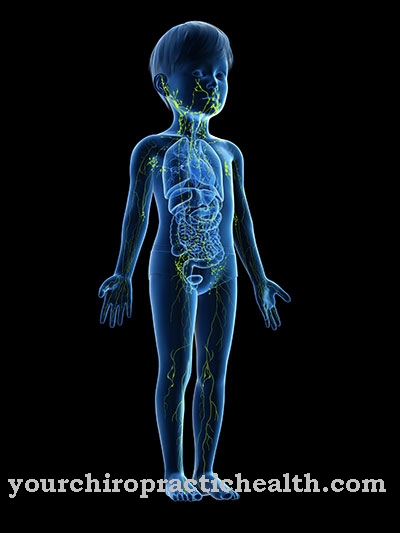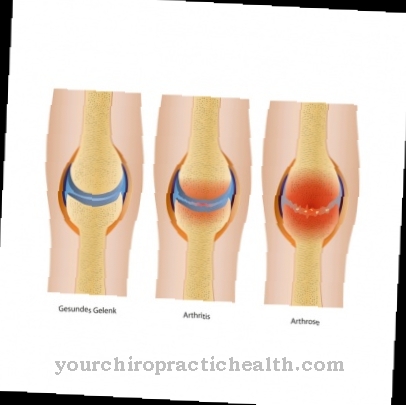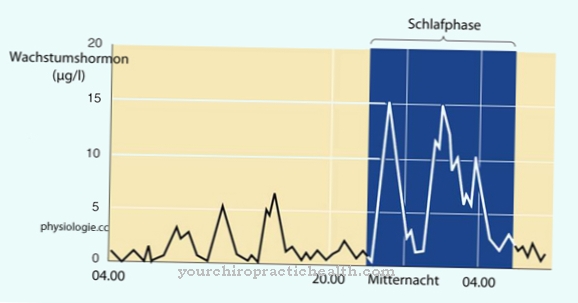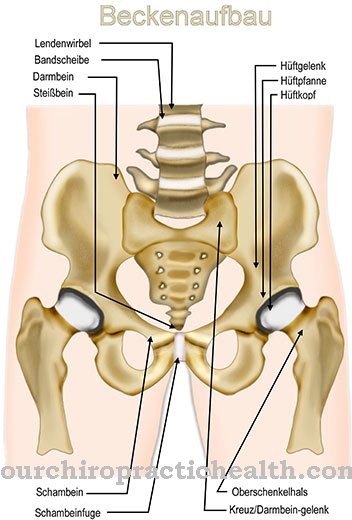Behind the Malassimilation syndrome is understood as an insufficient absorption and storage of nutrients, the causes of which are varied. Usually, symptom control is supplemented by individual therapy to treat causal factors.
What is malassimilation syndrome?

© Goffkein - stock.adobe.com
The Malassimilation syndrome is based on the fact that ingested nutrients cannot be used in sufficient quantities.
As a rule, the malassimilation syndrome is expressed by characteristic symptoms such as severe diarrhea and loss of body weight. The diarrhea typical of the malassimilation syndrome is also referred to in medicine as the so-called fatty stool; this stool has a clay-like, shiny consistency and is usually characterized by its characteristic pungent odor.
Since those affected by malassimilation syndrome usually pass large amounts of stool several times a day, deficiency symptoms often appear as a result; the organism lacks any minerals, vitamins and / or proteins it needs. Corresponding deficiency symptoms caused by malassimilation syndrome lead in many cases to a decline in performance and fatigue in affected patients.
causes
A present Malassimilation syndrome can have different causes. For example, the affected person may lack digestive enzymes that are required for the utilization of ingested food; if this means that digestion is restricted, this is also referred to in medicine as so-called maldigestion.
In this context, a restricted production of digestive juices can hide, for example, inflammation or removal of the pancreas. As a result of liver disease or gallstones, as well as diseases of the small intestine, a lack of bile acid (required for digestion) can ultimately lead to malassimilation syndrome.
Malassimilation syndrome can also develop when the organism of an affected person breaks down nutrients but cannot absorb them. This is possible, for example, due to infections orchronic inflammation of the intestine, malignant diseases of the small intestine, impaired intestinal blood flow or food intolerances such as gluten intolerance.
Symptoms, ailments & signs
The symptoms of malassimilation syndrome are diverse and unspecific. The way in which it appears depends primarily on the specific cause. Basically, the malassimilation syndrome is usually noticeable through disturbances in the digestive system. The chair is often particularly conspicuous. This can be smelly and bulky.
Some people suffer from chronic diarrhea. In some cases, so-called fatty stools, which are light, greasy and smelly, develop. Flatulence often occurs. Constipation is less common. A multitude of diffuse digestive complaints can occur, especially with the onset of malassimilation syndrome.
These include abdominal pain, stomach pain, heartburn, nausea, and vomiting. The symptoms can either become noticeable immediately after eating or only later. In some cases, they only appear after consuming certain foods. In the case of advanced malassimilation syndrome, there are additional symptoms such as muscle weakness, fatigue, fatigue or a general decline in performance.
Weight loss is usually noticeable due to the digestive disorders. The disturbed food intake also leads to deficiency symptoms. Frequent symptoms are hair loss, wound healing disorders, anemia, angular angular nerves, muscle wasting, tetany (over-excitability of muscles and nerves), neurological disorders, edema, coagulation disorders, tendency to bleed, night blindness and dry skin and mucous membranes.
Diagnosis & course
Due to the comparatively unspecific symptoms of a Malassimilation syndrome and the various causes that can be hidden behind the syndrome usually require different examinations in order to make an appropriate diagnosis.
Possible examination methods here include, for example, sonography (colloquially also known as ultrasound examination) or computer tomography, in order to depict areas of the abdominal cavity. Examinations of the stool and blood of an affected person can also provide evidence of a malassimilation syndrome. Depending on the suspected cause of the disease, the removal of tissue can also enable more specific diagnostic statements.
The course of a malassimilation syndrome in the individual depends primarily on the causes of the disease and on the possibilities of treating a corresponding cause medically. If the causal factors of a malassimilation syndrome cannot be eliminated, the course of the syndrome depends, among other things, on the success of symptomatic treatment.
Complications
First and foremost, those affected suffer from malassimilation syndrome from digestive disorders and thus from complaints in the stomach and intestines. This leads to severe diarrhea and, as a rule, gas. Furthermore, the patients also suffer from severe weight loss, which generally has a very negative effect on the patient's health.
Malassimilation syndrome also leads to fatigue, which causes the patient to be constantly tired. The resilience of those affected is also significantly reduced by this disease, so that there are various restrictions in everyday life. Furthermore, the malassimilation syndrome also leads to a lack of vitamins and minerals. This can lead to various complications and complaints, which have a very negative effect on the patient's health.
As a rule, there is always a causal treatment of the malassimilation syndrome. Furthermore, the lack of nutrients can also be compensated for by various solutions. There are usually no complications. However, this does not always lead to a positive course of the disease. Furthermore, the life expectancy of the patient can be limited by this complaint.
When should you go to the doctor?
People suffering from unexplained weight loss should consult a doctor. If there are digestive disorders, noise in the intestine or diarrhea, a doctor is required to clarify the cause. A doctor should be consulted in the case of fatty stools, constipation or pain when using the toilet. Any pain experienced in the stomach must also be examined and treated by a doctor. If the symptoms persist for several days, there is a health impairment that requires medical care. To prevent possible complications, pain medication should only be taken in consultation with a doctor.
If the usual muscle strength begins to decrease, if there is a performance weakness or if the person concerned suffers from exhaustion, a doctor should be consulted. Fatigue, nausea and vomiting are indications of an irregularity. If symptoms such as heartburn, wound healing disorders or diffuse deficiency symptoms occur, a doctor's visit is required. Hair loss, changes in eyesight or skin complexion must be clarified by a doctor. A doctor is required if the corners of the mouth are torn, the development of edema, as well as a tendency to heavy bleeding with minor injuries. Symptoms such as malaise, a feeling of illness and inner restlessness should be presented to a doctor as soon as they persist for several days or weeks.
Treatment & Therapy
Therapeutic measures with which one Malassimilation syndrome is to be countered, a distinction must first be made between interventions that combat the cause of the syndrome and measures that serve to alleviate symptoms.
In the context of combating symptoms in the presence of malassimilation syndrome, for example, the body's own fluid and electrolyte balance is often regulated (electrolytes are substances required by the organism such as salts and minerals); The aim of this therapy component is to counteract losses that occur in those affected by the severe diarrhea typical of the disease. A supplementary dose of nutrients such as vitamins serves to compensate for symptomatic deficiencies in those affected by malassimilation syndrome.
Symptomatic control of the syndrome is usually accompanied by accompanying, causal treatment steps; The therapeutic steps that take place are based on the individual symptoms that have led to a malassimilation syndrome. For example, if a syndrome is caused by gallstones, these can be removed in various ways. Inflammatory bowel diseases or circulatory disorders of the intestine must be checked medically, depending on the individual case and medical assessment.
You can find your medication here
➔ Medication for diarrheaOutlook & forecast
The prognosis of malassimilation syndrome depends on the causal disorder. If this is curable, the symptoms of the syndrome will also regress. In some cases, changing your diet can already bring about significant relief from the symptoms. A lack of nutrients can be compensated and thereby already contribute to an improvement in health. Cooperation with a doctor should take place so that the causal irregularities can be found and treated. Otherwise they often remain unexplained. In addition, there may be an increase in symptoms and thus a reduced quality of life.
If the cause of the disorder is the presence of foreign bodies in the organism, these must be completely removed. Gallstones or similar foreign bodies are removed from the organism in a surgical procedure. The treatment method is associated with risks, but is normally completed without problems. After the wound healing process, symptoms can be expected. Nevertheless, it must be taken into account that foreign bodies can arise again at any time in the course of life and the symptoms can regress. If there are inflammatory developments in the body, these must be completely cured in order for the malassimilation syndrome to have a good prognosis. In the case of intestinal inflammation, the healing pathways are often lengthy.
prevention
Factors such as food intolerance or chronic intestinal diseases, which can lead to malassimilation syndrome, can usually only be prevented to a limited extent. However, if an affected person has the corresponding underlying illnesses, then in many cases early and competent treatment or intervention steps can help prevent an occurrence Malassimilation syndrome to prevent; If the malassimilation syndrome is already present, appropriate treatment steps can counteract a worsening of symptoms.
Aftercare
Since malassimilation syndrome cannot heal itself, follow-up care focuses on dealing safely with the disease. Sufferers should try to focus on a positive healing process despite the adversity. In order to build the appropriate posture, relaxation exercises and meditation can help to calm the mind and focus mentally.
Those affected primarily suffer from malassimilation syndrome from a disturbed digestive system. This can be countered well with an appropriate diet that avoids fatty and acidic foods. The stomach complaints and abdominal pain limit the quality of life of those affected, so that it is not uncommon for mental disorders. The malassimilation syndrome also has a negative effect on the wound healing of the person concerned; this should be checked in close follow-up care in order to prevent complications. The further course depends strongly on the cause and also on the exact time of diagnosis of the disease, so that no universal prediction can be made.
You can do that yourself
Patients with malassimilation syndrome suffer from the diffuse symptoms of the disease and the associated decreased quality of life. Self-help measures are insufficient as the disease urgently requires professional medical therapy. Therefore, patients turn to a doctor in their own health interest. Diagnosis is often tedious because the symptoms are relatively unspecific and the disease also follows a certain underlying disease. It is therefore important that patients exercise patience and have further examinations carried out until an accurate diagnosis is made.
Depending on the individual case, the doctor will prescribe different nutrients, drugs or electrolytes to be taken. The patient follows the medical instructions in order to carry out the therapy successfully. In general, a healthy lifestyle supports the physical condition and well-being of those affected. This includes, in particular, avoiding tobacco and alcohol, as these luxury foods remove further nutrients from the organism.
To improve the patient's performance, he or she consults a professional nutritionist. Based on the individual diagnosis, he develops a diet plan for the patient. The aim of this plan is the best possible supply of relevant nutrients through the daily diet. Light sporting activities support the patient's physical well-being and emotional stability.


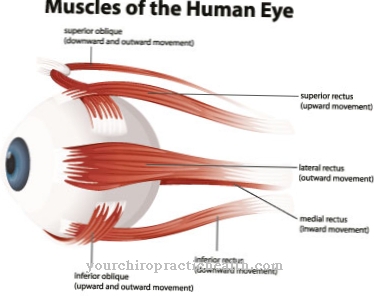
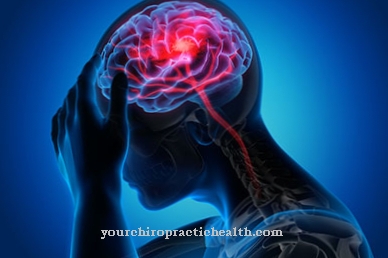
.jpg)
